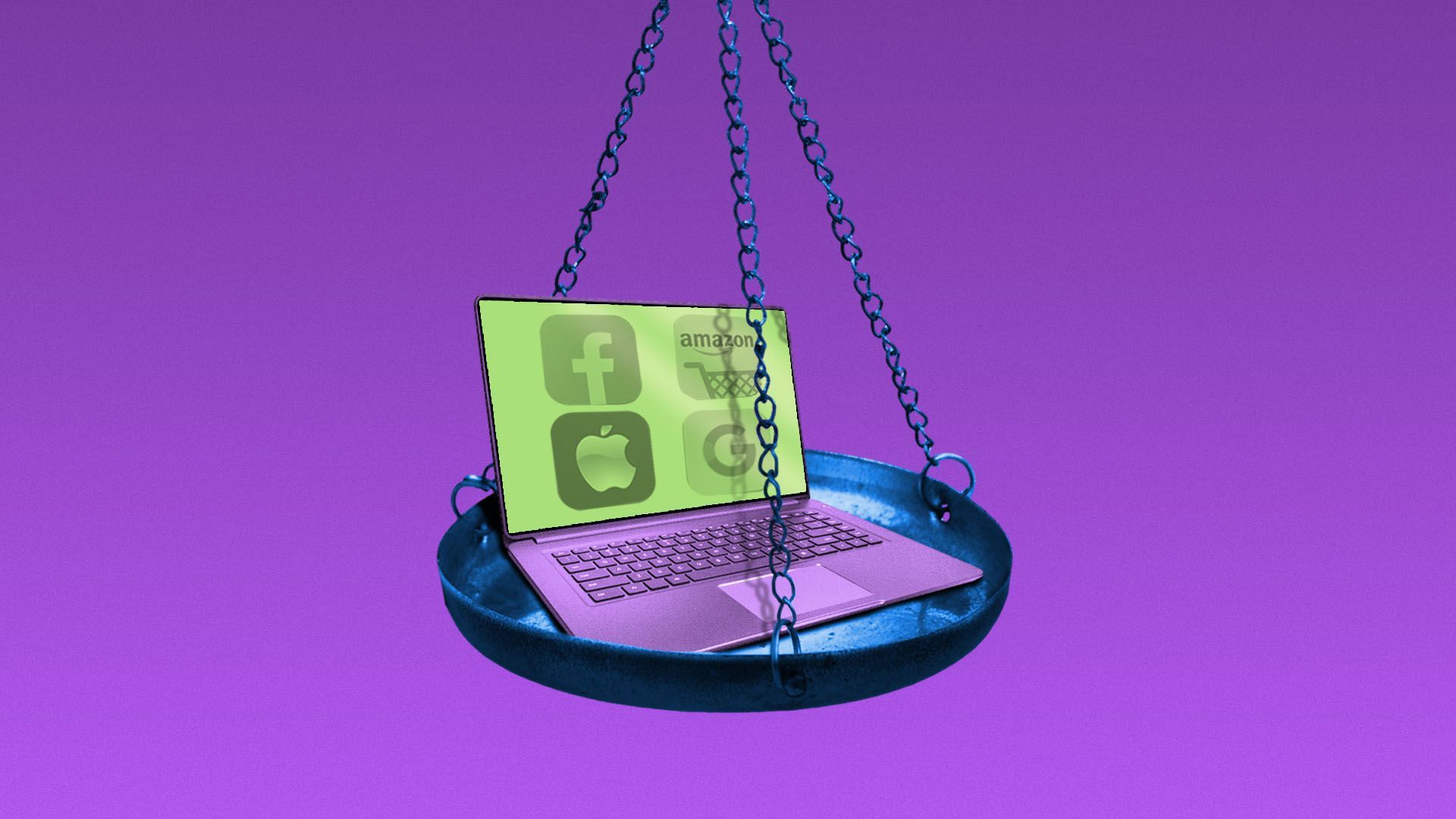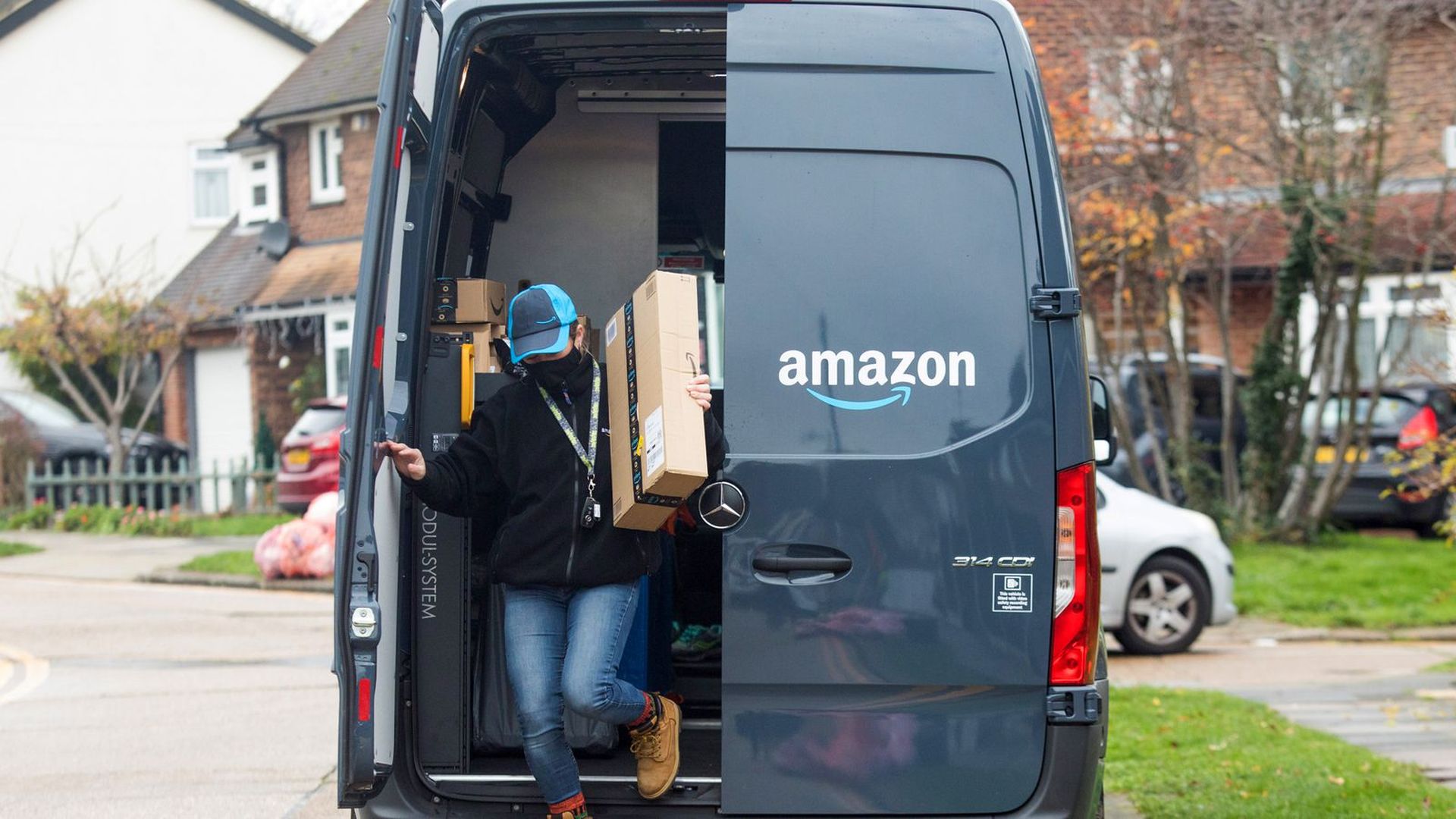| | | | | | | Login | | By Ina Fried ·Apr 05, 2021 | | Congrats to the Stanford Cardinal for their women's hoops championship in a nail-biter over a tough Arizona team. And while I had Stanford in the Login bracket challenge, my other picks only landed me sixth. Congrats to Digger's Dames aka dgredding79 for winning this year's Login Women's Hoops Bracket Challenge. Drop me a line if that's you. Situational awareness: LG confirmed late Sunday that it will exit the smartphone business globally after losing ground — and money — for years. Today's edition is 1,321 words, a 5-minute read. | | | | | | 1 big thing: Why the FTC is Big Tech's biggest D.C. threat |  | | | Illustration: Sarah Grillo/Axios | | | | While antitrust lawsuits and Capitol Hill hearings get headlines, Big Tech's biggest threat in Washington may come from the Federal Trade Commission, Axios' Kim Hart reports. Why it matters: The FTC is gearing up to flex its muscle, by both enforcing current rules and trying to draft new ones. And it may be able do so relatively quickly. Driving the news: Acting FTC chairwoman Rebecca Slaughter has created a new "rulemaking group" within the agency's general counsel's office, positioning the FTC to draft new rules cracking down on anticompetitive corporate behavior. - The move signals that Slaughter aims to be more aggressive than her recent predecessors, who focused on consumer protection issues like fraud.
- It's also a signal to the Biden administration — which hasn't nominated a permanent FTC chair yet — that if Slaughter gets the gig, she's open to testing all the agency's legal authority to keep Big Tech in check.
- FTC rulemakings could apply to multiple companies at once. For the platform companies, potential regulations could focus on app stores, data security, and transparency in algorithms.
Big Tech can also expect the FTC, which has the power to police companies' "unfair and deceptive" practices, to take more aggressive enforcement actions under the Biden administration, including lawsuits. - Slaughter has suggested the FTC's recent settlements didn't go far enough, and argues that executives should be held personally liable for violations.
- She criticized the agency's $5 billion fine against Facebook in 2019, stemming from the Cambridge Analytica data leak, saying it was too small and that Facebook and CEO Mark Zuckerberg should have been referred to the Justice Department for litigation.
Yes, but: The FTC is a relatively small agency with limited resources. - New rulemaking is a cumbersome process, and there are chances for stakeholders to slow it down even further. Congress added some speed bumps to the FTC's processes in the 1970s; lawmakers believed it was overstepping its bounds with moves like trying to ban some children's TV advertising.
- Rulemakings are used sparingly on relatively narrow issues, or when directed by Congress.
- Expanding use of its rulemaking authority would be new ground for the FTC, and there's no guarantee it will work.
- Antitrust suits don't always work out, either. The agency last week abandoned its four-year-long case accusing Qualcomm of using its dominance to squash competition. Slaughter said she still believes Qualcomm broke antitrust laws, but that the FTC faced "significant headwinds."
- Still, even failure to enact new rules could help the FTC argue that it doesn't have the tools it needs, and persuade Congress to give it more authority.
What to watch: President Biden recently nominated for FTC commissioner Lina Khan, whose legal analysis on Amazon helped propel the narrative that the big tech companies have too much power. - Biden hasn't yet named a replacement for the panel's third Democrat, Rohit Chopra, who's been nominated to lead the Consumer Financial Protection Bureau.
- Khan was previously a legal advisor to Chopra, who has argued that the FTC has the authority to make new rules targeting anticompetitive practices.
What's next: The FTC's actions have been relatively bipartisan and non-controversial in the past. But antitrust attorneys and former staffers say the FTC will likely become more partisan as it tries to take full advantage of its legal authorities. |     | | | | | | 2. Data from 500M users surface | | A leaker said Saturday they were making public personal information on 533 million Facebook users, including phone numbers, locations, birth dates and other data, Axios' Jacob Knutson reports. The latest: Though the data is resurfacing, the issue connected to the leaked data was "found and fixed" in August 2019, a Facebook spokesperson told Axios in a statement. By the numbers: The leak includes data from 32 million users in the U.S., 11 million users in the U.K., and 6 million users in India. Of note: The leaked data contains phone numbers, Facebook IDs, full names, locations, birth dates, bios and email addresses. It does not contain password information. - The data is personal, but much of it is likely to be public already, though perhaps not in this form.
My thought bubble: The leak may be old, but the amount of data is massive, well sorted by geography and now being shared widely around the web. |     | | | | | | 3. Amazon acknowledges some drivers pee in bottles |  | | | An Amazon delivery person exiting a van. Photo: Chris Ratcliffe/Bloomberg via Getty Images | | | | Amazon has apologized to Rep. Mark Pocan (D-Wis.), saying the company's recent tweet denying that drivers urinate in water bottles was "incorrect," Axios' Oriana Gonzalez reports. What they're saying: "[W]e know that drivers can and do have trouble finding restrooms because of traffic or sometimes rural routes, and this has been especially the case during COVID when many public restrooms have been closed," the company wrote in a blog post. - Amazon added the issue is not unique to the organization and that the company is looking for ways to solve it, saying that they "don't yet know how, but will look for solutions."
Flashback: The Verge in 2018 reported that Amazon employees were forced to skip bathroom breaks to fulfill high demand for deliveries. At the time, employees said they felt pressured to meet company goals. Context: Pocan criticized Amazon's working conditions last week, tweeting: "Paying workers $15/hr doesn't make you a 'progressive workplace' when you union-bust & make workers urinate in water bottles." - Amazon News replied: "You don't really believe the peeing in bottles thing, do you? If that were true, nobody would work for us."
- Vice released a report the following day showing pictures of bottles and other containers filled with urine. One Amazon driver told the outlet that drivers felt pressured to complete deliveries quickly and finding restrooms could slow them down.
Amazon said its tweet to Pocan "did not contemplate our large driver population and instead wrongly focused only on our fulfillment centers." My thought bubble: Amazon apologized to Pocan, but not to its workers or the public, and tried to make it seem like the issue is beyond its control. It's all part of a high-stakes aggressive PR campaign that could easily backfire, as I reported last week. Go deeper: For more, I talked about this on the latest episode of Axios Today. |     | | | | | | 4. ACLU says it shares data with Facebook, others | | The American Civil Liberties Union is raising eyebrows after updating its privacy policy to note that it is sharing data with Facebook, one of the companies whose policies it often criticizes. Why it matters: The move shows that even many organizations that don't like Facebook nonetheless find it an effective way to reach people online. Details: In the policy, updated April 1, the ACLU says that it may share personal information "with communications platforms, such as Facebook and Mother Jones," and "may also share ACLU supporter information with organizations that display our advertisements or petitions to their subscribers." - According to Fortune, the ACLU says the data shared includes includes names, email addresses, phone numbers, countries of residence, and ZIP codes.
Between the lines: The ACLU does offer people a way to opt out of the information sharing, but few people read privacy policies and fewer still go that extra step to opt out of data sharing. What they're saying: Former Federal Trade Commission CTO Ashkan Soltani, who consulted with the ACLU on its privacy practices, blasted the group both for its choices and for not being more upfront. - Soltani said in a Twitter thread Friday that the organization "sat on" his report for six months before making public the new privacy policy and said even the updated policy does not "reflect the full picture of their practices."
- An ACLU representative did not return requests for comment.
|     | | | | | | 5. Take note | | On Tap - Retail giant Target is holding ICCON, a free online enterprise tech conference on Wednesday and Thursday.
Trading Places - Waymo CEO John Krafcik said Friday he was stepping down as head of the Google parent company-owned self-driving car unit. Engineer Dmitri Dolgov, an original member of the Google self-driving team, and Tekedra Mawakana — who joined the company four years ago as head of public policy and most recently served as chief operating officer — will take the wheel.
ICYMI - A National Labor Relations Board report found that Amazon illegally fired prominent internal critics. (New York Times)
- An eagerly anticipated "Lego: Star Wars" title was delayed on Friday, the latest in a string of pushbacks of major game releases due this year. (Axios)
- Now at Protocol, Megan Rose Dickey took an in-depth look at some of the many issues facing Asian women in tech. (Protocol)
- Meanwhile, the Wall Street Journal offered a graphical look at how a blend of cooperation and competition defines the relationship among the largest tech companies. (Wall Street Journal)
|     | | | | | | 6. After you Login | | I saw lots of amazing basketball from both the college women's and men's teams in the Final Four, but I kind of can't wait till this kid is college age. |     | | | | | | Axios thanks our partners for supporting our newsletters.
Sponsorship has no influence on editorial content. Axios, 3100 Clarendon Blvd, Suite 1300, Arlington VA 22201 | | | You received this email because you signed up for newsletters from Axios.
Change your preferences or unsubscribe here. | | | Was this email forwarded to you?
Sign up now to get Axios in your inbox. | | | | Follow Axios on social media:    | | | | | |





No comments:
Post a Comment